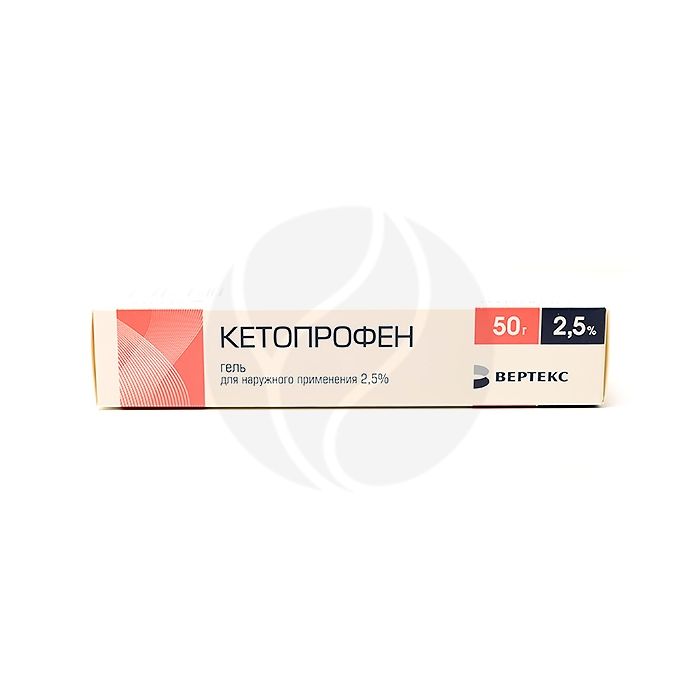Ketoprofen gel 2.5%, 50 g
Expiration Date: 11/2025
Russian Pharmacy name:
Кетопрофен гель 2,5%, 50 г
As a local anesthetic and anti-inflammatory drug for symptomatic treatment:
back pain, neuralgia, myalgia;
inflammatory and degenerative diseases of the musculoskeletal system, arthritis, bursitis, synovitis, tendinitis, lumbago;
uncomplicated injuries, in particular - sports injuries, dislocations, sprains or ruptures of ligaments and tendons, bruises, post-traumatic pain;
as part of combination therapy for inflammatory diseases of the veins (phlebitis, periphlebitis), lymphatic vessels, lymph nodes (lymphangitis, superficial lymphadenitis).
Outwardly. Apply a small amount (3-5 cm) of the gel to a sore spot and rub it in easily 2-3 times a day.
There is no need for a dry bandage. the gel is well absorbed through the skin, odorless, does not contain dyes, does not leave greasy spots, does not stain clothes.
Gel for external use
ketoprofen
excipients: polyethylene glycol; methylhydroxybenzoate; propyl hydroxybenzoate; carbomer; triethanolamine; purified water
Hypersensitivity to ketoprofen and / or other components of the drug, as well as to other NSAIDs and acetylsalicylic acid (bronchospasm may develop);
weeping dermatoses, eczema, infected abrasions, wounds, burns;
pregnancy (III trimester), lactation period.
pharmachologic effect
NSAIDs. It has an analgesic, anti-inflammatory and anti-edema effect. Inhibits the activity of COX, which leads to inhibition of the synthesis of prostaglandins. In addition, ketoprofen inhibits lipoxygenase, bradykinin synthesis, stabilizes lysosomal membranes and prevents the release of enzymes involved in the inflammatory process.
Ketoprofen does not adversely affect the condition of the articular cartilage.
Pharmacokinetics
Ketoprofen is absorbed very slowly and practically does not accumulate in the body. Bioavailability is 5%. Ketoprofen penetrates into the subcutaneous tissue, ligaments and muscles, synovial fluid and reaches therapeutic concentrations there. The concentration of the drug in the blood plasma is extremely low. Ketoprofen is metabolized in the liver to form conjugates, which are mainly excreted in the urine. Ketoprofen is characterized by slow excretion in the urine.
Side effect
Allergic reactions: very rarely - angioedema, anaphylaxis.
On the part of the skin and subcutaneous fat: infrequently - erythema, itching, burning, eczema, mild transient dermatitis; rarely - urticaria, rash, photosensitivity, bullous dermatitis, purpura, erythema multiforme, lichenoid dermatitis, skin necrosis, Stevens-Johnson syndrome; very rarely - a single case of severe contact dermatitis (against the background of poor hygiene and insolation), a single case of severe generalized photodermatitis, toxic epidermal necrolysis.
From the respiratory system: very rarely - asthmatic attacks (as a variant of an allergic reaction).
From the urinary system: very rarely - deterioration of renal function in patients with chronic renal failure.
Application during pregnancy and lactation
Contraindicated for use in the third trimester of pregnancy. Application in the I and II trimesters is possible in cases where the expected benefit of therapy to the mother outweighs the potential risk to the fetus.
Application during lactation (breastfeeding) is not recommended.
Application for violations of liver function
It should be used with caution in case of impaired liver function.
Application for impaired renal function
It should be used with caution in case of impaired renal function.
Application in children
Contraindication: children under 15 years of age.
Use in elderly patients
Use with caution in elderly patients.
special instructions
Avoid contact with the eyes, skin around the eyes, mucous membranes.
Ketoprofen can be used externally in combination with oral administration. The total daily dose, regardless of the dosage form, should not exceed 200 mg.
To reduce the risk of developing photosensitivity, it is recommended to protect the areas of skin treated with ketoprofen with clothing from UV exposure throughout the treatment period and for another 2 weeks after stopping the use of the gel.
Do not use as an occlusive dressing.
Drug interactions
Since the concentration of ketoprofen in the blood plasma is extremely low, symptoms of interaction with other drugs (similar symptoms with systemic use) are possible only with frequent and prolonged use.
The simultaneous use of other external agents containing ketoprofen or other NSAIDs is not recommended.
The simultaneous administration of acetylsalicylic acid reduces the degree of binding of ketoprofen to blood plasma proteins.
Ketoprofen reduces the excretion of methotrexate and increases its toxicity.
Patients taking coumarin-containing anticoagulants are advised to undergo treatment under the supervision of a physician.

